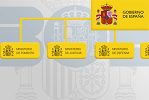Gestational surrogacy
Content
What is gestational surrogacy?
Gestational surrogacy is surrogacy by contract, paid or unpaid, whereby a woman abandons her maternal parentage rights in relation to the future child in favour of the contracting party or a third party.
Maternal parentage is the legal bond between a child and its mother.
Gestational surrogacy is also known as ‘surrogate motherhood’ or ‘rent-a-womb.’
Is it legal in Spain?
No, under Article 10(1) of Law 14/2006 of 26 May on Assisted Human Reproductive Techniques, a paid or unpaid contract under which a woman waives maternal parentage in favour of the contractor or a third party is null and void.
Registering on the Spanish Civil Register the birth and parentage of a child born in a foreign country by gestational surrogacy
The birth and parentage of a child born abroad by gestational surrogacy can be registered on the Spanish Civil Register on the following conditions:
- An order from a competent court establishing the parentage of the child must be submitted with the application to register the birth.
- The requirements laid down in the Instruction of 5 October 2010 of the Directorate-General for Registries and Notaries must also be met. These govern the system of registration of parentage of children born by gestational surrogacy under foreign court orders.
Is it necessary to supply an authorisation to execute the foreign court order?
The authorisation of execution is a set of rules whereby one state’s legal system verifies that a judgment issued by a court of another state meets the requirements for Spanish recognition and approval.
In this case, authorisation of execution of the foreign judicial decision must be obtained, unless an international convention is applicable.
Thus the court order completing this authorisation procedure must be submitted to the Spanish registry office with the application for registration, in order to proceed with the birth entry.
Is it possible to enter the birth on the Spanish Civil Register without supplying the authorisation of the foreign court decision?
Yes, it is possible to enter the birth on the Spanish Civil Register without supplying the authorisation of the foreign court decision, provided that the foreign court’s decision originated from proceedings similar to those followed in Spain in non-contentious matters.
In such cases, as a pre-registration requirement, the Registrar of the Civil Registry checks whether the court’s decision can be recognised in Spain.
What does the Registrar of the Spanish Civil Register check in relation to the foreign court’s decision?
The Registrar of the Spanish Civil Register checks in the foreign court's decision that:
- The foreign court’s decision and any other documents submitted are authentic and duly compliant.
- The court of origin established its international judicial competence according to criteria equivalent those prescribed by the Spanish legislation.
- The procedural rights of the parties, especially the surrogate mother, were guaranteed.
- The child’s overriding interest and the surrogate mother's rights were not violated (in particular, the Registrar must verify that the surrogate mother’s free and voluntary consent was obtained without error, deceit or violence, and that she has sufficient natural capacity. Deceit is the deliberate intention to defraud someone or to breach a contractual obligation).
- The court decision is final and cannot be appealed and the consents given are irrevocable or, if they were subject to a cooling-off period in accordance with the applicable foreign legislation, that this period elapsed without anyone entitled to do so revoking their consent.
Is it possible to register the child's birth and parentage on the strength of a foreign registry certificate or by simple declaration?
No. A foreign registry certificate or simple declaration with a medical certificate attesting the child’s birth, that does not record the identity of the surrogate mother, will not be accepted under any circumstances as sufficient evidence for registering the birth and parentage of a child.
Where the birth and parentage of a child born by gestational surrogacy abroad must be registered
-
In the transitional period until the introduction of the new civil status model:
in the consular civil registry of the place where the child was born.
-
Once the new civil status model is established:
registration of birth may be requested from any of the General Civil Registry Offices and Consular Offices in the district concerned.
Legal and/or technical references
-
Law 14/2006, of 26 May 2006, on techniques of assisted human reproduction

-
Instruction of 5 October 2010 of the Directorate-General for Registries and Notaries on the system of registration of parentage of children born by gestational surrogacy

-
Instruction of 18 February 2019 of the Directorate-General for Registries and Notaries updating the system of the registration of parentage of children born by gestational surrogacy

-
Decree of 14 November 1958 approving the Regulation of the Civil Register Law

-
Consular Civil Register











